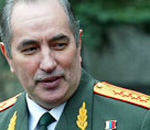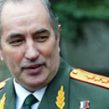
Military Reform in Russia Plows Ahead
Publication: Eurasia Daily Monitor Volume: 6 Issue: 83
By:

It was announced only last week that President Dmitry Medvedev signed an order dismissing four star General Valentin Korabelnikov -the all-powerful chief of military intelligence, the Main Intelligence Directorate or GRU. Korabelnikov (63) was appointed chief of GRU in May 1997 and the official reason for his dismissal was "old age." According to Russian law, generals may serve until 60 and their active service can be prolonged by presidential decree until 65, which is reviewed annually. The decree that ousted Korabelnikov from his post and retired him from military service was signed by Medvedev on April 14, but only published last week. First Deputy Chief of the GRU General Alexander Shlakhturov (62) was appointed as Korabelnikov’s successor. Shlakhturov’s age indicates he will be a provisional caretaker chief, presiding while the GRU is restructured (Kommersant, April 25).
Two other high-ranking Defense Ministry officials were ousted this month: Deputy Defense Minister in charge of budget and finance Lubov Kudelina, and the chief of the Main Personnel Directorate three star General Mikhail Vodzakin. Last month Vodzakin was retired from active service, though continuing to serve in the same position as a civilian. He was eventually replaced by General Viktor Goremikin (RIA Novosti, April 23). In May 2001 Kudelina, a former Deputy Finance Minister, became the first woman to be appointed Deputy Defense Minister in Russia. Kudelina was replaced by another high-ranking Finance Ministry official -Vera Chistova (Kommersant, April 16). With the departure of Korabelnikov, Kudelina and Vodzakin, Defense Minister Anatoliy Serdyukov, in office since 2007, has more or less ended the process of changing the top MoD officials appointed before him and in effect he has crushed the remnants of high-level resistance within the MoD to his controversial reforms.
Serdukov’s plans to modernize and westernize the Russian conventional armed forces have met with opposition. High-ranking generals dislike the planned reform, since it demolishes the old Cold War force modeled on fighting NATO and instead plans to create a new smaller standing army -designed using Western militaries as a prototype. In a recent interview former Defense Minister (1992-1996) General Pavel Grachev, summed up this widespread attitude: "In shaping reform plans we must not copy the nations that are preparing to conquer Russia." According to Grachev, Russia needs to maintain sizeable armed forces to defend itself and any future reform must be modeled on the experience of World War II, as he recalls that in the early 1990’s he successfully resisted attempts to "Americanize" the military (Nezavisimoye voyennoye obozreniye, March 20).
In March 2008 the Russian media reported a "general’s rebellion" against the reform within the MoD, led by the First Deputy Defense Minister and Chief of the General Staff of the Armed Forces Yuri Baluyevsky, supported by other top officials (Izvestia, Nezavisimaya Gazeta, March 24; Trud, March 25). Serdyukov in turn was supported by Medvedev and Prime Minister Vladimir Putin, and the "general’s rebellion" was defeated and its protagonists ousted one by one. Baluyevsky was removed in June 2008.
The GRU led by Korabelnikov seemed to be the last bastion of organized resistance to the reforms. The GRU is directly subordinate to the Chief of the General Staff and is a separate structure within the armed forces. Its agents perform global espionage operations and the GRU maintains operational control over Russian spy satellites. It also commands "special radio communications brigades" tasked with intercepting foreign electronic communications. The GRU gathers and analyzes intelligence information to present reports to Russia’s political and military leaders. The Chief of the General Staff approves these reports. The GRU, and through it the General Staff, have their own considerable independent combat capabilities -the Special Forces or Spetsnaz brigades (8 brigades at present) and smaller separate Special Forces units. The GRU and the General Staff control significant institutional capabilities to influence Russian defense, national security and foreign policy decision-making.
Reports have been circulating within the Russian press that the GRU faces serious reform. The GRU will be cut in size and might be split into several parts (Moskovskiy Komsomolets, January 9, Rossyiskaya Gazeta March 17). It seems to have been decided that the GRU Spetsnaz units will be subordinated to a separate Special Operations Command as in the United States. The GRU may also be fully removed from the General Staff and be subordinated to a civilian Defense Minister. This will prevent the General Staff top brass from doctoring intelligence reports and manipulating Russia’s defense and foreign policy decision-making.
The personnel of the General Staff, central staffs and command structures will be cut from 21,813 to 8,500 by 2012. In Moscow city and the Moscow region around 30,000 officers will be discharged (RIA Novosti, April 25). The Main Operational Directorate or GOU is the core of the General Staff and is in command of the strategic nuclear deterrent among other things. GOU personnel has been cut in half with some 200 generals and senior officers already dismissed (Interfax, April 3). It was announced that up to 20 percent of the top military commanders will be retired in disgrace, "as not conforming" to service standards (RIA Novosti, April 28).
The announced cuts are causing outrage within the military, but the reforms are fully supported by Russia’s political leaders. With high-level resistance squashed within the MoD, the grassroots discontent from rank and file officers will be disorganized. While some are fired, others are promoted and given better pay. Military reform in Russia plows ahead.




